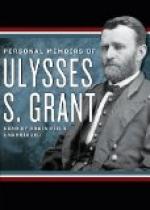This was characteristic of Mr. Stanton. He was a man who never questioned his own authority, and who always did in war time what he wanted to do. He was an able constitutional lawyer and jurist; but the Constitution was not an impediment to him while the war lasted. In this latter particular I entirely agree with the view he evidently held. The Constitution was not framed with a view to any such rebellion as that of 1861-5. While it did not authorize rebellion it made no provision against it. Yet the right to resist or suppress rebellion is as inherent as the right of self-defence, and as natural as the right of an individual to preserve his life when in jeopardy. The Constitution was therefore in abeyance for the time being, so far as it in any way affected the progress and termination of the war.
Those in rebellion against the government of the United States were not restricted by constitutional provisions, or any other, except the acts of their Congress, which was loyal and devoted to the cause for which the South was then fighting. It would be a hard case when one-third of a nation, united in rebellion against the national authority, is entirely untrammeled, that the other two-thirds, in their efforts to maintain the Union intact, should be restrained by a Constitution prepared by our ancestors for the express purpose of insuring the permanency of the confederation of the States.
After I left General Lee at Appomattox Station, I went with my staff and a few others directly to Burkesville Station on my way to Washington. The road from Burkesville back having been newly repaired and the ground being soft, the train got off the track frequently, and, as a result, it was after midnight of the second day when I reached City Point. As soon as possible I took a dispatch-boat thence to Washington City.
While in Washington I was very busy for a time in preparing the necessary orders for the new state of affairs; communicating with my different commanders of separate departments, bodies of troops, etc. But by the 14th I was pretty well through with this work, so as to be able to visit my children, who were then in Burlington, New Jersey, attending school. Mrs. Grant was with me in Washington at the time, and we were invited by President and Mrs. Lincoln to accompany them to the theatre on the evening of that day. I replied to the President’s verbal invitation to the effect, that if we were in the city we would take great pleasure in accompanying them; but that I was very anxious to get away and visit my children, and if I could get through my work during the day I should do so. I did get through and started by the evening train on the 14th, sending Mr. Lincoln word, of course, that I would not be at the theatre.
At that time the railroad to New York entered Philadelphia on Broad Street; passengers were conveyed in ambulances to the Delaware River, and then ferried to Camden, at which point they took the cars again. When I reached the ferry, on the east side of the City of Philadelphia, I found people awaiting my arrival there; and also dispatches informing me of the assassination of the President and Mr. Seward, and of the probable assassination of the Vice President, Mr. Johnson, and requesting my immediate return.




